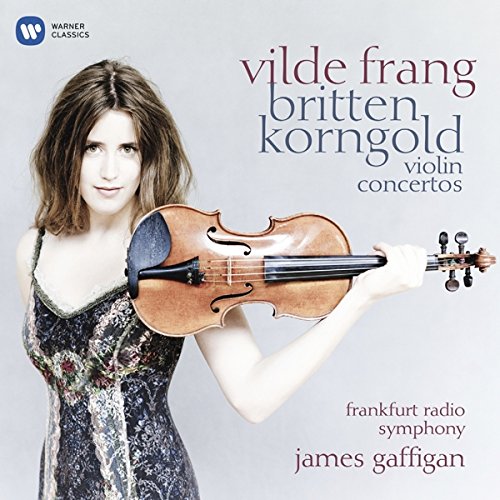KORNGOLD; BRITTEN Violin Concertos
View record and artist detailsRecord and Artist Details
Composer or Director: Benjamin Britten, Erich Wolfgang Korngold
Genre:
Orchestral
Label: Warner Classics
Magazine Review Date: 02/2016
Media Format: CD or Download
Media Runtime: 58
Mastering:
DDD
Catalogue Number: 2564 60092-1

Tracks:
| Composition | Artist Credit |
|---|---|
| Concerto for Violin and Orchestra |
Erich Wolfgang Korngold, Composer
Erich Wolfgang Korngold, Composer Frankfurt Radio Symphony Orchestra James Gaffigan, Conductor Vilde Frang, Violin |
Author: David Gutman
There are several paradoxes at the heart of Frang’s captivating performance style. Playing with almost intimidating dexterity and polish, not to mention impeccable intonation (it comes as no surprise to discover that Anne-Sophie Mutter was an early mentor), her music-making still manages to project an impression of honesty and naturalness. An exciting player, she prefers taking chances to playing it safe, in spite of which her interpretations feel airily unforced rather than ostentatious. It’s quite a feat and one reliant on supportive collaborators able to unfold a (sometimes unpredictable) musical narrative with comparable ease. Fortunately James Gaffigan, whose international career was launched in Frankfurt at the 2004 Sir Georg Solti International Conducting Competition, is with her every step of the way, as is the Frankfurt Radio Symphony Orchestra.
First up is Korngold’s escapist confection, and it receives a notably unsentimental reading. This is not to imply that the super-articulate music-making is either cool or predictable. The first-movement cadenza is assaulted with sudden anger, the slow movement played with a clean directness that sounds utterly fresh, at least until a riskily self-conscious inflection just before the end. In the emptier pyrotechnics of the finale Frang comes close to trumping Shaham, if not Heifetz (whose recording is the subject of this month’s Classics Reconsidered – see page 96). Her pure, sweet timbre is leaner but she is much assisted by sensitive conducting and the kind of sound engineering that exposes unexpected strands in the orchestral texture rather than unduly spotlighting the star. I found this a deeply satisfying take on a vehicle intended to slake Heifetz’s insatiable thirst for technical display rather than to extend Korngold’s compositional range. That said, you may feel that the swashbuckling needs a little more schmaltz to make it palatable.
From Korngold’s Romantic patchwork to Britten’s high seriousness (and his obsessive working of scalic material) is quite a leap, yet, with these exponents, there’s no hint of the latter overreaching himself in this extended, bleakly eloquent take on the Prokofiev violin concerto model. Indeed, the argument is projected with such searing intensity that the work asserts its claim to be considered one of the masterpieces of the last century. Once again Frang proves immaculate above the stave; and, because the third-movement passacaglia never gets bogged down in the manner of Vengerov and Rostropovich or Little and Gardner, the sense of looming threat is ever present through to the equivocal close. While Marwood and Volkov make the whole concerto feel more contemporary, brisker from the outset, texturally spikier and more fractured than Lubotsky with Britten himself as conductor, there are other aesthetic possibilities. Whatever the work’s pockets of English reserve, Frang refuses to undersell those passionate outbursts fuelled by the composer’s political and moral convictions during and after the Spanish Civil War. This is a remarkable rendition, at once spacious and tautly held together, cool where it needs to be but eminently emotive with just the right kind of ‘perilous sweetness’. The soloist’s tone is never remotely wiry or frayed and the harmonics are simply sensational.
Here then are two ardent performances to complement or even supplant existing favourites. Such technical inviolability and emotional truth is born of long familiarity. In 2013 Frang and Gaffigan took the Britten as far afield as Sydney and, as YouTube aficionados will know, the Korngold is an old friend too. That the works’ American connections are ably explored in Mervyn Cooke’s booklet-note is the icing on the cake.
Discover the world's largest classical music catalogue with Presto Music.

Gramophone Digital Club
- Digital Edition
- Digital Archive
- Reviews Database
- Full website access
From £8.75 / month
Subscribe
Gramophone Full Club
- Print Edition
- Digital Edition
- Digital Archive
- Reviews Database
- Full website access
From £11.00 / month
Subscribe
If you are a library, university or other organisation that would be interested in an institutional subscription to Gramophone please click here for further information.




